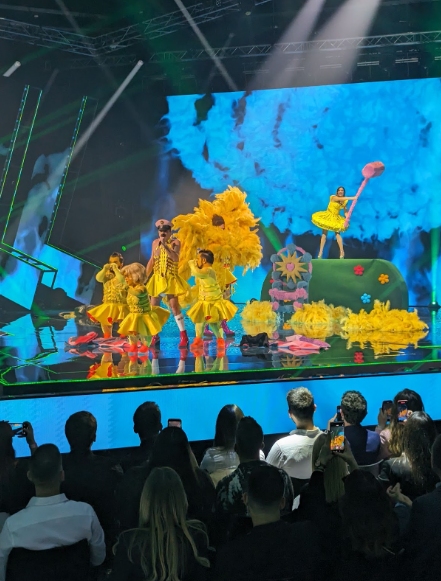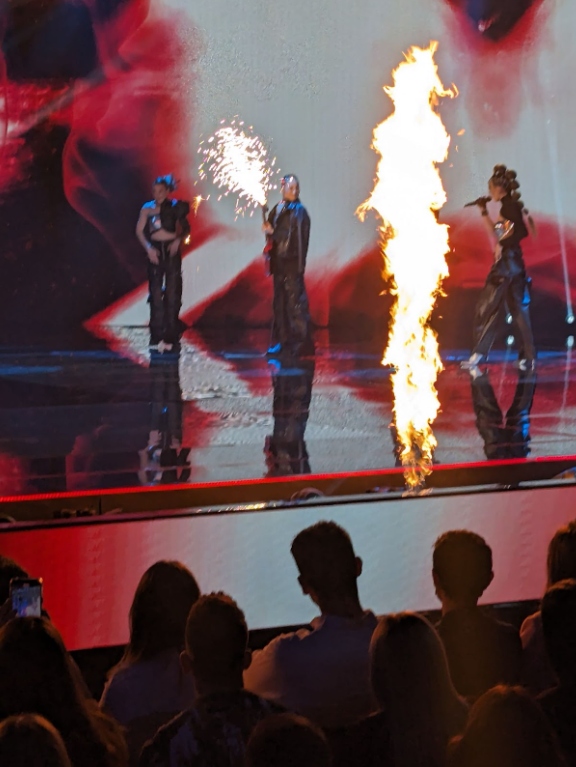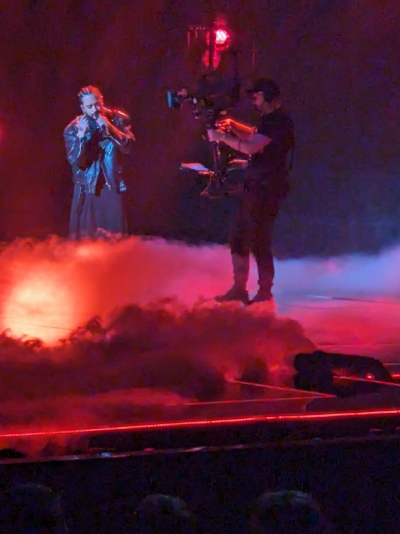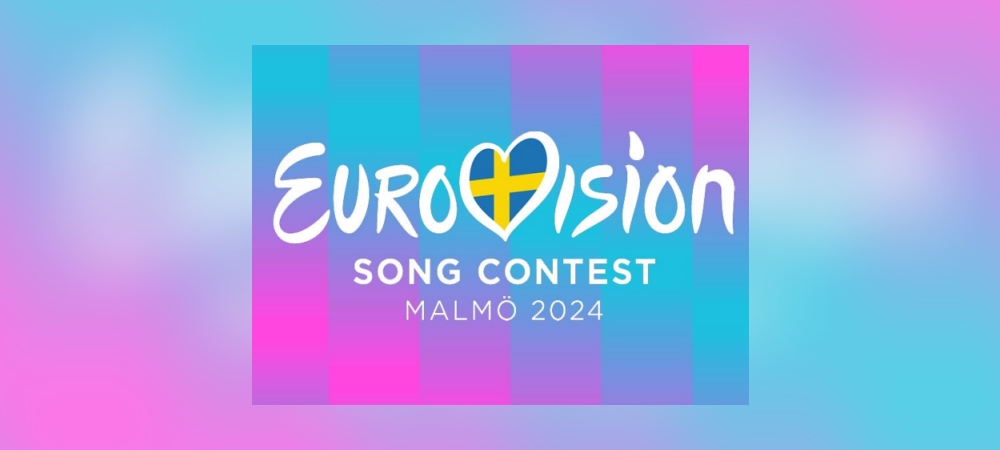With Australia’s Voyager proving to be very popular at Eurovision last year, the message is clear: Eurovision and prog rock are no longer mutually exclusive! It’s high time that we all got invested in this long-running song contest and hope that it can spread awareness of prog even further. Truthfully, I would have liked to have seen the group perform an ultra-complex song that would dazzle and befuddle audiences (my go-to reference for a three-minute prog-out is Gentle Giant’s Cogs in Cogs) but I can respect the band’s desire to hustle and write a more marketable tune.
I think that most of us are still gutted that Sweden got the win even though Käärijä performed an extremely original and entertaining song that won over the masses. The coincidence of Sweden winning one year before the 50th anniversary of ABBA’s win seems too large to overlook and it seems inevitable that the presenters will want to ram this down our throats during the broadcast.

Independent of where the show is taking place, however, there are some fantastic songs to entertain us this year, including from my current home country, Croatia. I was fortunate enough to attend Dora, Croatia’s Eurovision selection festival. I saw twelve acts compete in the first semi-final, including Let 3, the barmy Istrian rock group that stormed the Eurovision stage last year with Mama ŠČ!. Their new song, Baba Roga was performed with little people dressed as chicks as well as a surprise appearance by Croatian superstar Severina, who also performed in Eurovision in 2006.
It was a wild evening that saw eight of the acts advance to the next stage, rather like a mini-Eurovision. Of the four acts that didn’t make it, I was disappointed that the opener Noelle got eliminated as her uninhibited performance of Baby, Baby, replete with a modified firework-guitar that shot sparks into the air, seemed closest to the spirit of Eurovision.

Another NQ made much more sense on the night; Misha’s performance of One Day was laughable, with terrible live vocals, ridiculous Daft-Punk-inspired helmets and a lot of dad-dancing. Nevertheless, the tune was an earworm and I found myself listening to the studio version more often than I’d care to admit, especially as the popular Netflix show of the same name keeps getting suggested to me.
The evening was capped off with three songs from this year’s French contestant, Slimane, including his love-ballad entry, Mon amour. It was immediately apparent that his vocal power was on a different level to everything else we had heard that night. His powerful voice was laced with grit, and he had the extraordinary ability to let the emotion in his songs make his voice falter, giving his performance imperfections that ultimately made the track even stronger.
But his power play came at the end of his performance of Mon amour when he decided to take several steps back from the microphone and perform the final verse a cappella. I was stunned to learn that none of the fans had been expecting this, as the final chorus is not a cappella in the studio version. It’s such an impressive move because it required Slimane to keep time while belting out the chorus so that he would come back in at the same time as the backing track, all while doing his stage movements. The broadcast proves that his voice could travel across the room and that he doesn’t even require a mic to sound good. But you’ll have to believe me when I tell you just how magnificent he sounded in that large studio; his voice truly filled the room.

I wasn’t present for the second semi-final, which saw Baby Lasagna make his live debut to a rapturous audience. His chantable, Rammstein-inspired anthem Rim Tim Tagi Dim has caused a stir among online Eurovision fans which has reached something of a fever pitch. Ironically, he wasn’t even in the original Dora line-up but was a backup artist, something that has drawn criticism for local broadcasters HRT. While the Internet was in fervour it remained to be seen if Baby Lasagna’s style and charisma would translate to real votes.
The Internet needn’t have worried. Baby Lasagna won by a landslide, earning 321 points out of a total of 929. By comparison, the 2nd place artist Vinko – with his Lying Eyes and flaming piano – only got 82 points, a quarter of Baby Lasagna’s. Quite why Rim Tim Tagi Dim is so revered is beyond me. Compared to, say, Cha Cha Cha – and I feel like many comparisons can be drawn between these artists such as love of Rammstein and frilly sleeves – RTTD seems a lot less original and creative. With lyrics in English however, RTTD has a message that more Europeans can follow, that of a young man leaving his agricultural heritage and migrating to a big city, not dissimilar to the narrative of Rush’s Subdivisions. However, Baby Lasagna imbues his song with meme-worthy lyrics such as “Meow cat, please meow back”, only boosting the song’s appeal. While Rim Tim Tagi Dim is lacking in some of the eclecticism that made Cha Cha Cha such a hit with audiences last year, I’m still nonetheless hopeful that it will bring Croatia the win so that I might be able to attend Eurovision in person next year.
Baby Lasagna faces some stiff competition. A new poll placed Switzerland’s Nemo even higher than Baby Lasagna – his operatic vocals on the highly dynamic The Code, as well as the flurry of genres that the song encompasses in its brief three minutes, are certainly nothing to sneer at. That being said, I could see how the song could be a bit like Marmite: Nemo’s boyish schtick might be a lot for some audiences to take in, especially if they’re prepared to vote for a more predictable number. With so much going on, The Code isn’t all that catchy either and can be hard to sing along to. Still, I’m hoping for an entertaining stage performance as the music video, which involves multiple costume changes on a moving train, is very creative.
Even more creative, however, is Joost Klein, representing the Netherlands with Europapa. This track works on so many levels that it’s hard to remember them all. First of all, the music harks back to the Dutch club music of the late 90s and early 00s with simple melodies played quickly; it even includes a gabber breakdown in the latter half of the song which is sure to be a nostalgic throwback for many in Joost’s home country (formerly mine, too). The song itself is a celebration of Europe and all that it offers, which seems like perfect subject matter for Eurovision. There’s also an underlying message to Joost’s late father that’s reflected in the song’s title. The lyrics are inventive and well considered and the music is upbeat but has a hint of melancholy to it. The piano in the opening chorus is utterly infectious. This could honestly be my favourite track of the year.
Time for a few shout-outs to other great tracks this year. Armenia’s Jako sees the country returning to their native tongue for the first time since 2018’s Qami. While the country’s recent tracks have been pretty westernised, Ladaniva (named after the mass-produced Soviet car) have made one of the most traditionally Armenian songs we’ve heard at Eurovision, albeit with a feminist twist that I was overjoyed to hear. The 6/8 polyrhythm underpins a jovial, festive atmosphere complemented by singer Jaklin Baghdasaryan’s vocalisations. As repetitive as the song is, the duo don’t outstay their welcome: this has to be one of the shortest Eurovision songs I’ve ever heard at just two minutes and twenty five seconds. I think it’s a wise strategy to stop when you’ve said all you want to.
I see a few Eurovision artists turning to rap in rather innovative ways such as Ukraine’s Teresa & Maria and Italy’s Angelina Mango. Others are tapping into nostalgia such as Austria’s dippy future tense We Will Rave which features an absurd number of naked male torsos in its music video. The song which will most likely agree with prog fans however is Ulveham by genuine prog folk group Gåte. With esoteric lyrics concerning witches and werewolves on a foundation of heavy metal accompanied by folk instruments, this is a delightful alternative to the regular pop dross that Eurovision is known for.
And yeah, there’s a lot of that too. After finally putting effort into doing well in Eurovision in 2022, it’s disappointing but inevitable to see the UK return to the status quo with boring pop that won’t make a dent in the scoreboards. Azerbaijan, Israel and Malta are just some of the countries that also go this way, but it’s especially disappointing to see Luxembourg end their three-decade Eurovision hiatus with such a forgettable song. Why bother? Former Eurovisioners Natalia Barbu and Hera Björk (possibly related to that Björk, but only cos they live on the same island) will also make their return after representing Moldova in ‘07 and Iceland in ‘10 respectively. I doubt they will fare much better this time around, however, as their songs are not very memorable either.
With 37 countries involved in this gigantic song festival, I’ve barely scratched the surface of all that’s going on; what I love so much is that there are always more layers to uncover, like a fractal of music and drama that all converges in this climactic crazy event that happens every year. Even if the songs and the performances are all predetermined beforehand, the meeting of all those minds at Malmö will undoubtedly be a legendary event and I can’t wait for all the results to be announced. It’s sure to be a party.
LINKS
Eurovision Song Contest – Website | Facebook | YouTube

